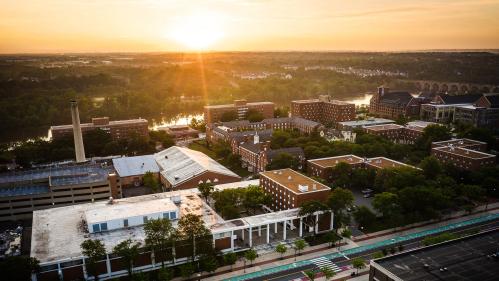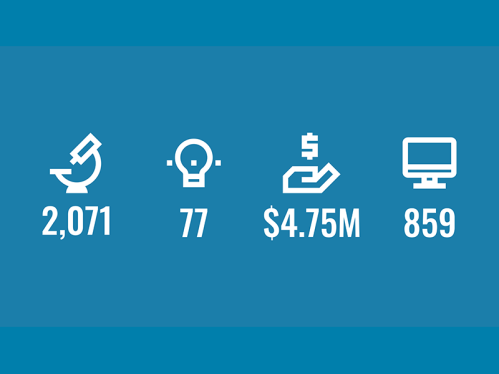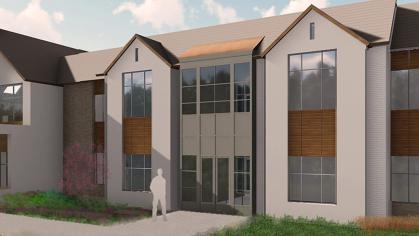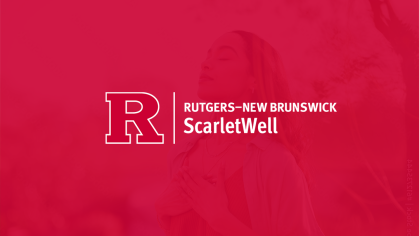The Rutgers Climate and Energy Institute contributes to a resilient, equitable, and sustainable climate future by connecting faculty, staff, and students through transformative climate change research, innovation, education, and outreach.

It's always possible here.
A glimpse into how we've been driving progress through our shared purpose—and delivering meaningful impact across our campus, our state, and beyond.
Chancellor's Message

Rutgers University–New Brunswick is a driver of opportunity: A national leader in producing successful graduates and transformative research, a regional catalyst for economic growth and community well-being, and an anchor institution for the great state of New Jersey.
Our ambitious Academic Master Plan has brought Rutgers–New Brunswick to a new era of prominence. Read on to learn how we prioritize student wellness, create interdisciplinary scholarly communities to address society’s great challenges, and support growth as an Innovation and Economic Prosperity University.
Our shared purpose of excellence in teaching, research, and service points to one important truth: It’s all possible here.
Sincerely,

Francine Conway, Ph.D.
Chancellor and Distinguished Professor,
Rutgers University–New Brunswick
Setting the Standard
As students face today's rapidly changing academic pressures, their mental health has never been more important. An excellent university responds by prioritizing wellness and basic needs, empowering students to thrive.
Innovation for Impact
Innovation is in Rutgers–New Brunswick’s DNA. We believe in expanding our understanding of the world and our place in it and stretching the boundaries of our collective knowledge to develop bold new approaches for addressing humanity’s greatest challenges.
Research Milestones
-
2,071 research awards garnered, totaling $337.6M in FY24 (10% above FY23)
-
77 patents issued
-
$4.75M in licensing revenue earned
-
859 active technologies supported

Chancellor Signature Initiatives
The Office of the Vice Provost for Research convened new, interdisciplinary scholarly communities around four strategic areas: climate and energy science, data science and artificial intelligence, life sciences, and behavioral health and equity. These communities have led to the launch of three new Chancellor Signature Initiatives for research:
The Cluster on Data Science and Artificial Intelligence (CDSAI) is a cross-disciplinary scholarly community focused on the societal benefits and implications of artificial intelligence, machine learning, and data science.
This RAD Collaboratory serves as a hub for data science, artificial intelligence, student programming, and community engagement across multiple research areas.
Academic Master Plan
The Academic Master Plan serves as the roadmap for Rutgers–New Brunswick’s future. Built upon four essential pillars of academic accomplishment, the plan clarifies strategies to accomplish the university’s academic mission in its pursuit to be a national leader among institutions of higher education, exemplifying excellence in inclusive research, pedagogy, and service toward the common good.
Re-Imagining Higher Education
Rutgers is a national leader in producing successful graduates—students who graduate on time, with minimal debt, and are prepared to succeed in their future pursuits and as engaged citizens.
Public university in the U.S.
U.S. News & World Report
higher graduation rate than the national average
of 2024 graduates reported positive career outcomes within six months of graduation
median salary post-graduation
Focused on Student Success
Academic Excellence
Rutgers–New Brunswick students receive unprecedented opportunities to grow and excel. In the past two years, more than 20 students have been recognized by some of academia's most prestigious fellowship programs, including the Fulbright, Goldwater, Truman, Gates Cambridge, Schwarzmann, and Marshall awards.
Expanding the Classroom
New Vice Provost for Experiential Learning Chuck Keeton was installed to collaborate with partners from across Rutgers–New Brunswick and the wider university to help create new high-impact experiential learning opportunities that will best prepare students for future success.
Supporting Our Communities
As New Jersey’s anchor institution and state university, Rutgers–New Brunswick has deep roots in the Garden State, and we are fully committed to celebrating—and investing in—our shared prosperity. We’re proud to support New Jersey’s communities through our on-the-ground initiatives across the state and serving as an economic catalyst to enhance the lives of New Jerseyans.

Here for Good
From the hills of Highpoint to the beaches of Cape May, explore the many ways New Jersey makes a positive impact in the lives of New Jersey’s incredible people.
An Economic Engine
Rutgers–New Brunswick is one of only 80 institutions nationwide to be designated as an Innovation and Economic Prosperity University, which recognizes our substantial and sustained commitment to economic engagement in New Jersey and across the region through the launch of thousands of startups through our business incubators including:
The Food Innovation Center
Supports more than 3,500 food and agricultural startups and the commercialization of 500+ products, including the national launch of the Impossible Burger.
The Center for Advanced Infrastructure and Transportation
Selected as a “Beyond Traffic Innovation Center” by the U.S. Department of Transportation, tackles infrastructure challenges through research on earthquake-resistant bridges, structural health monitoring and pipeline risk assessment and trains 11,000+ transportation professionals annually.
The New Jersey Small Business Development Centers
Facilitates more than $1.95 billion in 2023 sales revenue and supporting thousands of jobs through comprehensive business advisory services, counseling, training and business launch support.
Rutgers Cooperative Extension
New Jersey's largest community engagement program, training more than 1,202 volunteers in environmental stewardship and civic engagement, with initiatives such as the Rutgers Environmental Stewards educating 3,835 individuals and enhancing 480 acres of wildlife habitat throughout the state.








